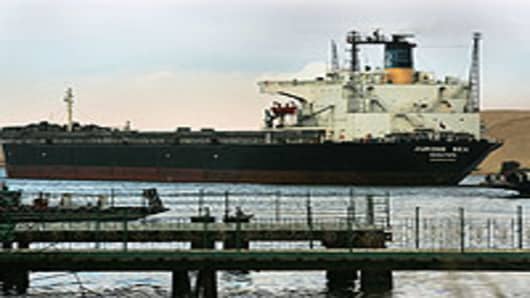Oil could hit $220 a barrel if "Libya and Algeria were to halt oil production together," analysts at Nomura investment bank predicted.
Such a shock would reduce OPEC spare capacity to just 2.1 million barrels a day, levels similar to those seen during the first Gulf War and in 2008, when prices hit $147 per barrel, they wrote.
If the supply disruption and the resulting price action where to mirror 1990-91 then we could see $220 a barrel within a couple of months, according to Michael Lo from Nomura, who also warned that speculation could make that price even higher.
"We could be underestimating this, as speculative activities were largely not present in 1990-91," Lo added.
The price action could be big for oil in the coming weeks, Jim Bianco, president of Bianco Research, said.
"Oil either goes up because of higher demand or a supply shock. Supply shocks are bad for the economy while higher demand is good as it means the economy is doing well," Bianco said.
"I would suggest this will be over in a couple of weeks and whether it hits $220 or not, it will then level out before falling again," he added.
The Risk-Off Trade
When Goldman Sachspredicted oil could hit $200 a barrel in 2008, crude was trading closer to $30 dollars a barrel within a couple of months, David Bloom, global head of foreign exchange strategy at HSBC, pointed out.
In the currency markets the trading is being driven by risk, not macro fundamentals, Bloom said.
"If this market was being driven by fundamentals then you would be piling into the Canadian dollar , Mexican peso or Norwegian krona ," he said. "Money that would be expected to go into currencies with oil reserves like Canada is instead going into the Yen, despite Japan being the world's biggest importer of oil"
"Risk is driving oil and oil is driving everything else," Bloom said.
Investors now need to position their portfolios for an oil shock, said Mohamed El-Erian, the CEO of bond giant Pimco, who also sees opportunities for investors.
"Whatever risk premium you attached before to the supply of oil has to go up. The world is entering a period where it's going to be dealing with an oil price shock, so it's important to understand this in positioning any of your portfolios," El-Erian said.
"In terms of opportunities, many oil exporters out there who don't have geopolitical issues who are benefiting from high oil prices. Countries like Canada, like Russia, like Indonesia, many countries out there. So ironically all these geopolitical factors are a good thing, they are better off," he added.
Goldman Sachs also said Thursday that fears of contagion from Libya to other oil producing countries were driving the oil price, Reuters reported.
"The market cannot accommodate another disruption, in our view, with the problems in Libya potentially absorbing half of OPEC's spare capacity," Jeffrey Currie said in a research note quoted by Reuters.



